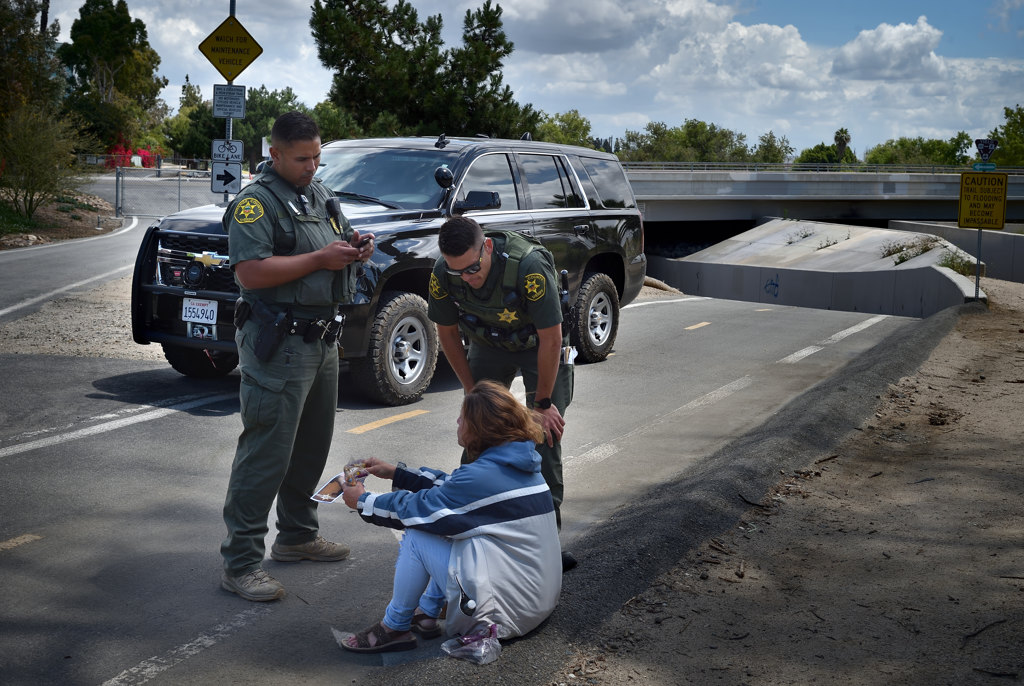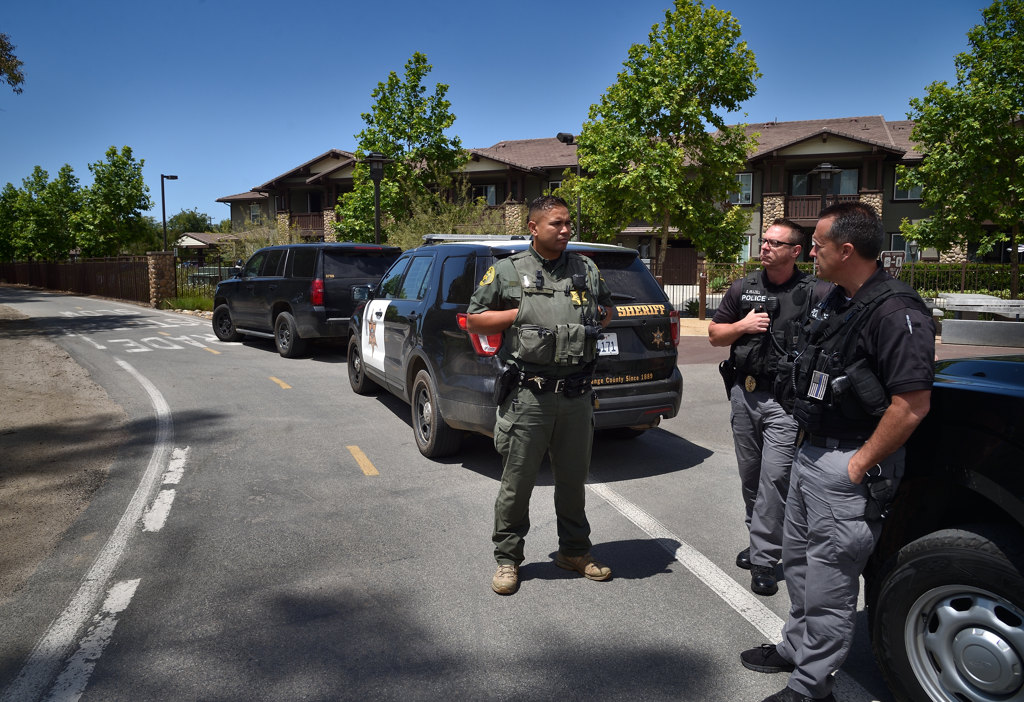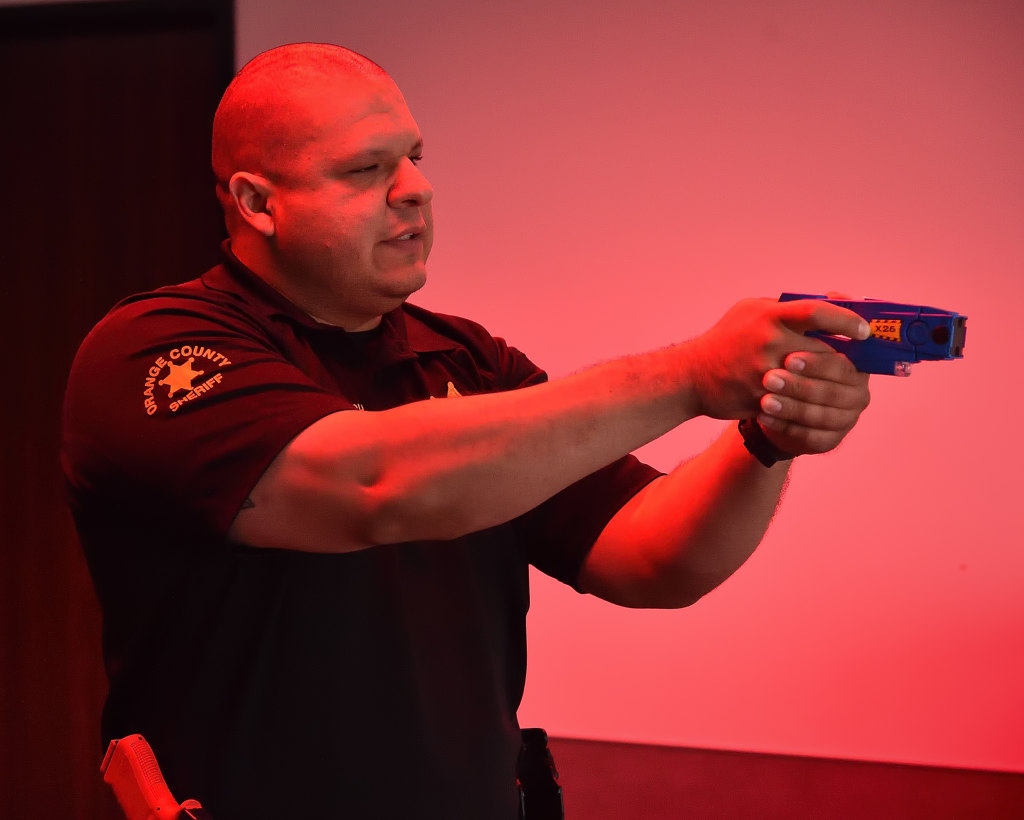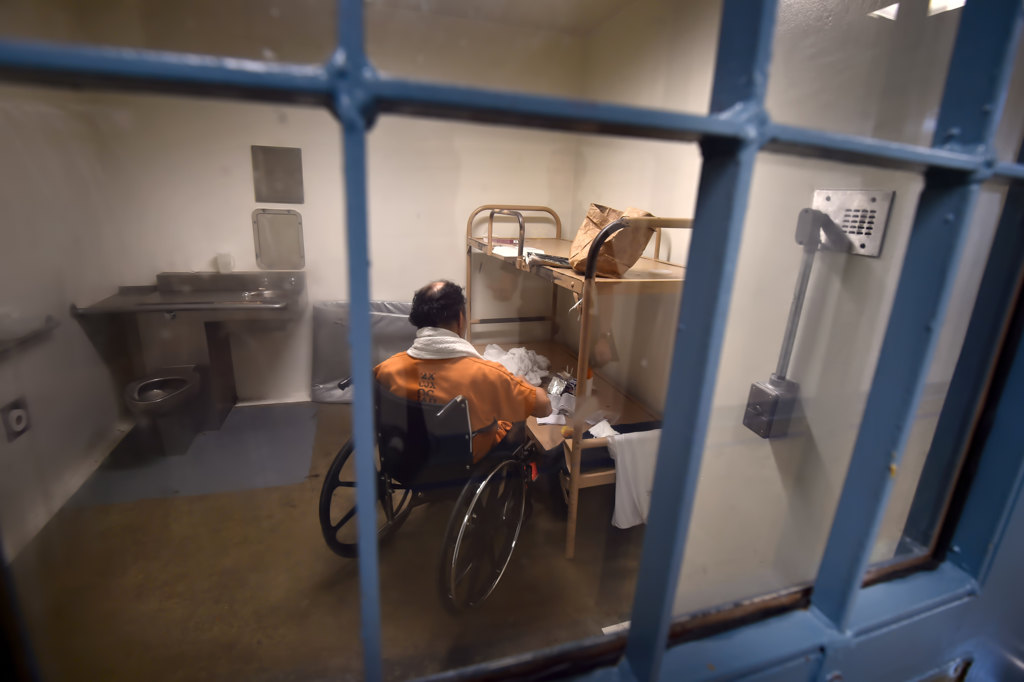On the streets, Orange County Sheriff’s Department patrol deputies are receiving more training in how to handle contacts with the mentally ill.
At the Tactical Training Center in Orange, deputies are honing such skills by going through recently introduced scenarios involving a live actor who may or may not be in the throes of a schizophrenic break.
And in the county’s jails, work is under way to dramatically improve the way those with mental illnesses are processed, housed, and connected to the services they need.
On several fronts, the OCSD is taking a proactive approach to behavioral health and the exploding mental health crisis, which often is intertwined with such entrenched societal problems as homelessness and drug and alcohol addiction.
As Mental Health Awareness Month draws to a close, here’s a glimpse at how the OCSD has become a model law enforcement agency in addressing mental health on the streets, in training, and in its jails.
‘WE’RE ALL HUMAN BEINGS’
On a recent weekday, deputies on the OCSD’s North Patrol HOT (Homeless Outreach Team) made contact with a woman in a park.
With her were her two daughters, 11 and 10.
“Why are your daughters here?” Deputy Jonathan Israel asked the woman, who was vague about how she and her daughters ended up homeless and sleeping in a tent at Schweitzer Park in Anaheim.
“Why aren’t they in school?” he asked the mother.

OCSD deputies from North Patrol HOT (Homeless Outreach Team) are, from left, Dep. Chad Ensil, Dep. Jon Jackson, Sgt. Tim Critz, Dep. Tyrone Enriquez, Sgt. Bill Burk and Dep. Jonathan Israel.
Photo by Steven Georges/Behind the Badge
Launched in November 2016, there are four deputies and two sergeants assigned to HOT in the OCSD’s North Patrol Area (there also is a HOT in south county). The multi-jurisdictional HOT partners with Orange County Public Works, The Orange County Probation Department, and the County Health Care Agency (HCA), along with numerous non-profits, such as City Net and Shelter Options, to aid the homeless in Orange County.
Although receptive, at first, to Israel’s offer for assistance, the woman eventually declined and walked away.
But that didn’t stop Israel from taking matters into his own hands.

OCSD Dep. Chad Ensil, left, and Dep. Jonathan Israel talk to a homeless woman found along the Santa Ana River Bed in Orange about getting help through available services, including shelters.
Photo by Steven Georges/Behind the Badge
He took the girls to Ross Dress For Less to buy them new clothes, fed them, and then brought them to the school they used to attend, talking to the principal and case workers from the (HCA).
One of Israel’s partners, Deputy Jonathan Jackson, said Israel’s actions that day are the norm for HOT members. Sheriff’s managers have taken note of the incident, specifically the countless dangers the two girls faced living on the streets with a mother who may have had her own issues to deal with.
“We’re all human beings, and we have to look out for each other,” said Jackson, an OCSD deputy for seven years who has been on the North Patrol HOT for more than a year and a half.
“We (OCSD) are very proactive,” Jackson said, referring to helping the homeless and those who have mental illnesses get connected to the right services. “I think we’re cutting edge on the issue — we’re proactive, not reactive.”
Jackson put in for HOT after working patrol.

While on patrol, OCSD Dep. Chad Ensil, left, touch bases with Orange PD Officers Sean Feazell and Sgt. Mark Bailey along the Santa Ana River Bed in Orange.
Photo by Steven Georges/Behind the Badge
“It’s definitely a different perspective than what you would see on normal patrol, only because we deal with a lot more people with mental health issues,” he said. “It’s something that you definitely have to be interested to learn about or are willing to learn about.”
He added: “I think you have to be the type of person that can walk the line between enforcing the law while maintaining a human perspective – the same you do on patrol, but this is a little bit more delicate. Often, we’re dealing with people that are more down on their luck or struggling with narcotics or alcohol use or mental illness. We try to be as relatable and personal as possible.”
Members of HOT undergo hours of specialized training. Members of HOT and Sheriff’s Homeless Liaison Officers are required to attend Homeless Outreach-specific training in addition to 40 hours of Crisis Intervention Training, which introduces the deputies to different types of mental illnesses and teaches them intervention and de-escalation techniques.
“Even back in the academy,” Jackson said, “I think our department does a great job with preparing recruits for some of the issues they’re going to be dealing with on the streets.”
He said ongoing, routine training in the area of behavioral health is becoming the norm at the OCSD – and that’s a welcome trend.
“The numbers (of people with a mental illness) are up across the board, and they’re increasing every year,” Jackson said. “This isn’t something that’s just going to go away.”
EXPANDED TRAINING
At the Tactical Training Center (TTC) in Orange, deputies (as well as law enforcement personnel from around the region) are trained to make split-second decisions on whether to use force in scenarios involving virtual reality and real actors.
In January, the OCSD introduced a live scenario in a mock town designed for training tactics that involves an actor portraying a subject who is going berserk inside a home, said Tactical Training Center Sgt. Isaac Flores.

OCSD Sgt. Issac Flores at the Orange County Sheriff’s Department Tactical Training Center in Orange.
Photo by Steven Georges/Behind the Badge
“Mental health is a trend that we’re trying to keep up with because the deputies routinely confront people (with mental health issues) in the field,” Flores said. “And if they’re not aware of how many contacts could be related to mental illness, then they may underestimate what they’re dealing with and may not strategize appropriately.”
The state does not mandate that mental health training be part of normal perishable skills training, but the OCSD has decided to be proactive and offer it as part of its Firearms and Tactical Simunitions Class, Flores said.
“This is not a mental health-specific class,” he said. “We were just trying to find a little avenue to insert a mental health topic in a class that deputies need to take every two years. It’s very relevant, and it has a lot to do with safety. And the training is flexible enough to allow us to put a little mental health spin on it. So that’s what we’ve chosen to do.”
Recruits receive some mental health training in the regular six-month academy at the OCSD’s Regional Training Facility, but the new training is aimed at greatly expanding on that.
When making contact with a person who may have a mental illness, deputies need to be on point in their communications skills, Flores said.
De-escalation, he explained, requires cooperation —a deputy cannot deescalate a situation unless the subject cooperates.

OCSD Dep. Michael Marroquin runs through the OCSD Tactical Training Center shooting simulator.
Photo by Steven Georges/Behind the Badge
“That requires a deputy to be patient, to really listen, to be empathetic and attentive, to use simple statements and be aware of his or her eye contact and body language,” Flores said.
“Sometimes it’s difficult to do, especially if you don’t have (the training) ingrained in you,” he added. “And, of course, this training is in the perishable skills block. What we’re trying to do is make sure that some of these best practices stick.”
In addition to scenarios with live actors and virtual reality, the OCSD has incorporated some material provided by POST (State of California Commission on Police Officers Standards and Training) into its courses.
A training video for deputies includes some stark statistics, such as that one in 17 adults suffers from schizophrenia.
In the live-actor training, a subject makes a big commotion and tears up the inside of a house.
“Would you show up and knock on the door and introduce yourself, or contact the (reporting party) on the phone and have him or her come out?” Flores asked. “Does what is happening sound criminal at the time, based on what the reporting party has said?”
These are just some of the questions a deputy would have to consider on such a call, he said.
BIG UPGRADES AT JAIL
With an average daily inmate count of 6,000, the OCSD operates one of the largest jail systems in the nation.
Of these inmates, nearly a third – or 1,800 – have some type of mental illness, many of them severe, said Commander Joe Balicki, who oversees Custody Operations with his immediate boss, Assistant Sheriff William Baker.
“(The number of housed mentally ill) has constantly been on the uptick over the last few years,” said Balicki, a 32-year veteran of the OCSD who took over command of custody operations in March 2018.
“One of the things I recognized when I first met with our correctional health services staff — our partners with the Health Care Agency — is that we have a severe behavioral health crisis not just in the jail system, but countywide,” said Balicki, who noted that one of his deputies recently was stabbed by a mentally ill inmate.
Balicki and Baker came up with a plan that Sheriff Don Barnes endorsed in March when he announced that the OCSD would be terminating its contract with the U.S. Immigration and Customs Enforcement Agency (ICE) and would stop holding immigration detainees in its jails so it could improve its mental health care for inmates.
The termination with ICE is effective Aug. 1.
Over the last year, the nurses and doctors who make up the behavioral health teams in OC’s jails have expanded their screening process to better identify those who need immediate care, Balicki said.
In one module of the Central Jail Complex in Santa Ana, the number of beds reserved for male inmates diagnosed with severe mental health issues will be increased to 30 from five, Balicki said.
Fifteen beds will be put in for female inmates in need of mental crisis stabilization, and work areas will be expanded for jail medical staff and deputies, as well as members of the several outside mental health partners with whom the OCSD works.
“It’s a very aggressive approach, and it’s all been approved,” said Balicki, who said construction is scheduled to be completed by November 2020.
What’s more, deputy staffing will be in place by Aug. 1, when construction on the jail revamp is scheduled to begin, Balicki said.
Instead of going through a costly and lengthy hiring process to bring in 40 new deputies to provide security in behavioral health units in the revamped jails, the OCSD is in the process of transferring 40 deputies from the James A. Musick facility on unincorporated land between Irvine and Lake Forest – part of Barnes’ plan announced in March.
“As construction starts,” Balicki said, “we’ll already have the security staffing in place.”
A new Musick facility near Irvine is scheduled to open by 2022, he said.
“Moving forward, in the next couple of years, we’ll get everybody in the jails trained in (mental health),” Balicki said.
The OCSD also recently stopped releasing most inmates late at night and in the early morning hours and switched to 7 a.m., when many critical services are available.
“Our goal is as soon as you come in the door, you start receiving (mental health) services,” Balicki said. “And when you do get released, you will know exactly where you need to go to get help.”
 Behind the Badge
Behind the Badge





